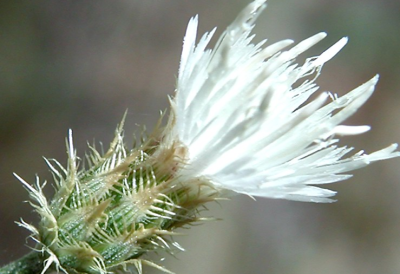Colorado Diffuse Knapweed
Colorado diffuse knapweed’s blooms emerge from what is called an urn-shaped base. It’s an almost peaceful image that defies the harsh reality of the plant that is on Colorado’s noxious weed list because of how easily and rapidly it invades and dominates new territory.
A single stem emerges from each germinated diffuse knapweed seed and branches develop as the plant grows. Each branch has a set of slender leaves and a white bloom develops at the end of each branch. No one is tempted more than once to pick Colorado diffuse knapweed to add to a bouquet of wildflowers. Sharp and prickly hair-like protrusions surround the base of the numerous flowerheads on the plant.
Colorado Diffuse Knapweed Reproduction
The plant prefers full sun and semi-arid conditions, which makes Colorado a perfect home for this non-native plant. It has a relatively short growing period. Seeds from mature plants germinate in the spring or fall and grow into a non-descript, if scrub-like weed, called a rosette. The plant doesn’t produce seeds this early in its life so it’s possible to remove it at this stage without the risk of spreading seeds. However, if the visible plant is only mowed or partially pulled (that is, the root is not completely removed), Colorado diffuse knapweed’s thick taproot can develop a new plant if optimum conditions exist.
The noxious weed follows a three-year sleep, creep, leap cycle when it comes to developing seeds and blooming. But because it blends so well with the landscape during its first two years of life, diffuse knapweed isn’t usually identified early. The weed typically reaches full maturity and the result is up to 18,000 seeds per plant developing to start the process anew.
If you have Colorado diffuse knapweed on your property, contact SprayTech, professional Colorado weed control specialists, at 720-248-0000 to discuss weed control options.


